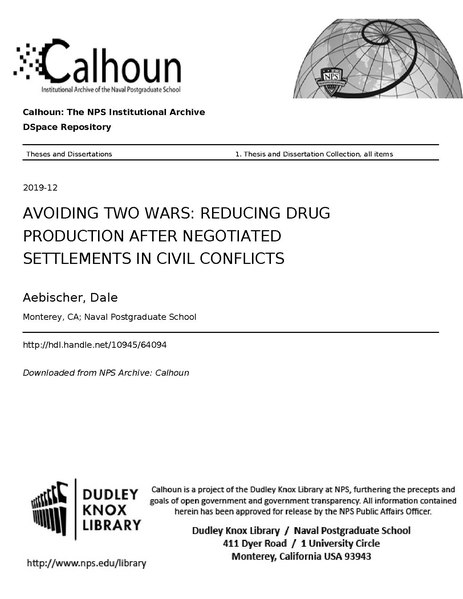File:AVOIDING TWO WARS- REDUCING DRUG PRODUCTION AFTER NEGOTIATED SETTLEMENTS IN CIVIL CONFLICTS (IA avoidingtwowarsr1094564094).pdf

Original file (1,275 × 1,650 pixels, file size: 993 KB, MIME type: application/pdf, 72 pages)
Captions
Captions
Summary[edit]
| AVOIDING TWO WARS: REDUCING DRUG PRODUCTION AFTER NEGOTIATED SETTLEMENTS IN CIVIL CONFLICTS
( |
||
|---|---|---|
| Author |
Aebischer, Dale |
|
| Title |
AVOIDING TWO WARS: REDUCING DRUG PRODUCTION AFTER NEGOTIATED SETTLEMENTS IN CIVIL CONFLICTS |
|
| Publisher |
Monterey, CA; Naval Postgraduate School |
|
| Description |
This thesis’s overall aim was to answer the question: Was it possible for the Colombian government to achieve lasting peace through its 2016 peace deal with the Revolutionary Armed Forces of Colombia (FARC) without leading to an increase in drug production? Critics of the peace deal and U.S. policymakers point to several concessions made during the peace negotiations (amnesty, reparations, drug trafficking, natural resources, and land reform) as likely causes of a spike in coca production. The Colombian government insists these concessions were necessary to achieve a signed peace agreement. A quantitative analysis of a global dataset demonstrates that none of the controversial provisions within the Colombian peace deal have a significant relationship with conflict recurrence, while political party reform proves to be the most significant of all independent variables to achieve lasting peace. Thus, the Colombian government can reduce coca production without increasing the risk to return to armed conflict by working jointly with the newly created FARC political party to revamp haphazardly implemented land reform agreements. The Colombian government needs to avoid latching on to baseless quick-fix solutions (e.g., aerial spray programs) and limit its adherence to provisions in the peace deal that have no impact on a lasting peace. Under these conditions, the Colombian government can avoid a heightened drug war following the end of a fifty-year-old civil war. Subjects: peace deal; peace negotiations; Colombia; rebel financing; narcotics; drug trade |
|
| Language | English | |
| Publication date | December 2019 | |
| Current location |
IA Collections: navalpostgraduateschoollibrary; fedlink |
|
| Accession number |
avoidingtwowarsr1094564094 |
|
| Source | ||
| Permission (Reusing this file) |
This publication is a work of the U.S. Government as defined in Title 17, United States Code, Section 101. Copyright protection is not available for this work in the United States. | |
Licensing[edit]
| Public domainPublic domainfalsefalse |
This work is in the public domain in the United States because it is a work prepared by an officer or employee of the United States Government as part of that person’s official duties under the terms of Title 17, Chapter 1, Section 105 of the US Code.
Note: This only applies to original works of the Federal Government and not to the work of any individual U.S. state, territory, commonwealth, county, municipality, or any other subdivision. This template also does not apply to postage stamp designs published by the United States Postal Service since 1978. (See § 313.6(C)(1) of Compendium of U.S. Copyright Office Practices). It also does not apply to certain US coins; see The US Mint Terms of Use.
|
 | |
| This file has been identified as being free of known restrictions under copyright law, including all related and neighboring rights. | ||
https://creativecommons.org/publicdomain/mark/1.0/PDMCreative Commons Public Domain Mark 1.0falsefalse
File history
Click on a date/time to view the file as it appeared at that time.
| Date/Time | Thumbnail | Dimensions | User | Comment | |
|---|---|---|---|---|---|
| current | 22:48, 14 July 2020 |  | 1,275 × 1,650, 72 pages (993 KB) | Fæ (talk | contribs) | FEDLINK - United States Federal Collection avoidingtwowarsr1094564094 (User talk:Fæ/IA books#Fork8) (batch 1993-2020 #8865) |
You cannot overwrite this file.
File usage on Commons
The following page uses this file:
Metadata
This file contains additional information such as Exif metadata which may have been added by the digital camera, scanner, or software program used to create or digitize it. If the file has been modified from its original state, some details such as the timestamp may not fully reflect those of the original file. The timestamp is only as accurate as the clock in the camera, and it may be completely wrong.
| Author | Aileen B. Houston |
|---|---|
| Short title | AVOIDING TWO WARS: REDUCING DRUG PRODUCTION AFTER NEGOTIATED SETTLEMENTS IN CIVIL CONFLICTS |
| Image title | |
| File change date and time | 09:22, 12 December 2019 |
| Date and time of digitizing | 09:22, 12 December 2019 |
| Date metadata was last modified | 09:22, 12 December 2019 |
| Software used | Acrobat PDFMaker 17 for Word |
| Conversion program | Adobe PDF Library 15.0 |
| Encrypted | no |
| Page size | 612 x 792 pts (letter) |
| Version of PDF format | 1.4 |

